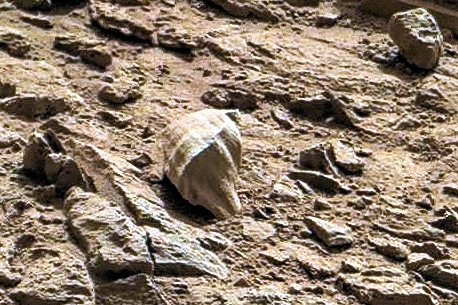Celebrating 20 years of exposing the truth about Life on Mars

Yes, there is primitive life on Mars
Mars Experiment Shows Tough Going For Life
"The key finding is that perchlorate, an already powerful oxidant, or bactericide, found in combination with magnesium, calcium and sodium on Mars, becomes even more toxic to Bacillus subtilis when the bacteria are subjected to ultraviolet radiation levels found in the thin Martian atmosphere."
The truth:
A Perchlorate Strategy for Extreme Xerophilic Life on Mars?
Study: Bacteria Eats Toxic Waste
Some Deep-Sea Microbes Are Hungry For Rocket Fuel
"Liebensteiner was interested in a chemical called perchlorate. It's a major ingredient in solid-rocket motors like those used on the space shuttle. It also exists naturally in small quantities on Earth, and on Mars. Some bacteria can use perchlorate to survive, and Liebensteiner wanted to see if the Archaea might also be able to use it as an oxygen substitute.
It's not part of A. fulgidus's normal diet, but the little guys seem to love it. "We found out it's using it for growth and for survival," he says. The work appears in Thursday's issue of the journal Science.
Liebensteiner says the new work shows that the ability to breathe many different chemicals might be more fundamental to early life than previously thought. Colwell agrees. A. fulgidus' ancestors probably sucked up whatever chemicals they could to survive on the hostile early Earth. "They develop a sort of diversity, a bag of tricks if you will, that allow them to survive under different conditions, and this might be one," he says."
"Xerophilic organisms are often also halophilic, some of them thriving in hypersaline solutions, conditions which would be expected on Mars, at temperatures well below the freezing point of pure water.
Xerophilic adaptations would allow microbes to grow at very low water activities. Even E. coli cells are able to generate up to 70 % of their intracellular water during metabolism rather than from
extracellular sources [6]. The antifreeze and hygroscopicity properties would make perchlorate and H2O2-water solutions ideal adaptation tools for life in the Martian cold desert. Adaptation to highly
oxidizing compounds would also convey adaptation advantages to deal with high radiation doses on the Martian surface. Evolution on Earth favored (salt) water as an internal solvent, but in dry and cold conditions a mixture of water with hydrogen peroxide as intracellular solvent and/or an adaptation to perchlorate-water mixtures would be much more favorable. A lesson learned from evolution of life on Earth is that microorganisms use the resources of
their environment optimally, and we expect that to be the case for Mars as well."
"The bugs target a toxic chemical called perchlorate, a dry powder used in munitions manufacturing that has seeped into groundwater across the United States.
But what is perhaps most important, scientists say, is that these bugs do something that no other organism been known to do. While transforming perchlorate to table salt, the bacteria suck out oxygen, generating that precious energy source without the help of sunlight. Since the bacteria are found everywhere, they could be put to work at sites by simply stimulating them with the food they need, Achenbach said, including acetic acid, another word for vinegar."
Martianlifeforms.com established in 1997 as "The Peculiar Rocks of Mars"